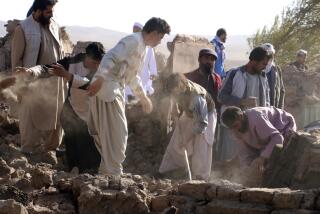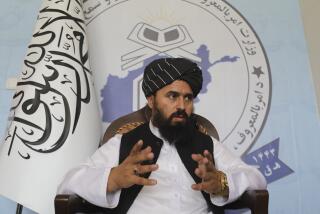Afghan Expatriates Thrill to Woman’s Appointment
- Share via
QUETTA, Pakistan — The news that a woman has been named deputy prime minister of Afghanistan made headlines around the world Wednesday, but perhaps nowhere did it mean as much as in a small clinic here, halfway down an alley swirling with noise, donkeys and dust, miles from the Afghan border.
Here, the real significance could be read in the faces of three nurses who stood behind a curtain in the narrow maternity room--broad, shy smiles, with a hint of surprised pride.
In more ways than one, this day marked their own victory. Sima Samar, named by Afghan negotiators in Germany as one of five deputy prime ministers in the new transitional government, has worked by their side at this clinic for years. She is, like them, an Afghan woman.
“I have a very definite opinion about her: She is qualified. She has the ability for the job she has been appointed for,” said Kubra Mehirab, a 50-year-old nurse who fled Taliban violence in her hometown in Afghanistan to work among Afghan refugees in Pakistan.
“When we were working at the hospital under the Taliban, no one had the right to work shoulder to shoulder with a man. For those years, they tried to stop us. Now the situation is turned around.”
Mahzawar Angoor, 60, protested that she was too old and uneducated to have an opinion and clutched her scarf over her face. But then she let the scarf fall. “I thank God that now we have a woman in the government,” she declared. “We always say welcome to peace. Maybe a woman knows how to keep it.”
Samar, 44, is a physician and founder of the Shuhada Organization network of clinics, hospitals and schools that began in this southern Pakistani border town and spread all over central Afghanistan. In addition to the deputy prime minister job, she has been appointed minister of women’s and children’s affairs in the interim government.
Also named to the government was Suhaila Seddiqi, a female physician and retired general who served in the Afghan armed forces during the Soviet occupation. She was named health minister.
“Women are going to play a real role in Afghan society, not only in government,” Lakhdar Brahimi, the chief U.N. mediator at the German talks, told reporters Wednesday. “There are women’s organizations that are really militant and active.
“I challenge those interested in the fate of women in Afghanistan: Please continue making statements, but look at the agreement we have concluded,” he said, urging activists to campaign for girls’ education improvements. “Send them desks, send them books, send them clothes.”
Samar has become internationally known for her work on behalf of Afghan women and children in defiance of the Taliban regime’s ban on girls’ education and women in the workplace.
Here in Quetta, she is perhaps less well known, except among the thousands of Afghan refugees and ethnic Hazara immigrants from Afghanistan and Iran who make use of her two clinics, technical schools and food distributions.
In the noisy neighborhood known as Hazara Town, Samar is a local heroine, and her appointment to the government Wednesday was cause for celebration.
Many men seemed as optimistic as the women.
“I am so happy she has been nominated. I went just now to the house and I heard the news. Now my country will be safe, and I can call it a country again,” said Haji Ali Jan, a 54-year-old tailor.
Sitting on the floor of his cramped shop behind an old sewing machine, Jan carefully stitched a cotton chemise and told how he and his son had faced arrest at the hands of the Taliban before finally fleeing to safety in Pakistan in 1999.
“Why shouldn’t we be enthusiastic about her?” he asked. “She is educated and she is patriotic, whereas those Taliban, I cannot even call them Afghans.”
Most of Quetta is populated by members of conservative Pushtun tribes whose women venture only occasionally into the streets and tend to dress in conservative, dark garb.
Hazara Town stands in remarkable contrast, its women draped in long, colorful scarves, elbowing their way past men through the narrow streets and gossiping on street corners.
An ethnic minority in Afghanistan, the Hazaras faced the particular wrath of the Taliban, which began to impose a strict version of Sunni Islamic law over the country in 1994. Under the Taliban, large numbers of Hazaras, who are followers of Shiite Islam, were killed or imprisoned, or fled to Pakistan and Iran.
Samar, the daughter of a government official in the southern Afghan city of Lashkar Gah, went to a coed school there and then earned her medical degree from Kabul University. She operated a clinic in her hometown but fled Afghanistan after the Soviet invasion, opening a clinic in Quetta in 1985.
Three years later, she launched the Shuhada (Martyrs) Organization, which has since grown to include 56 schools, four hospitals, 14 clinics and more than 21 training centers in central Afghanistan, focusing on women and children.
When the Taliban ordered girls’ schools closed, Samar worked to set up schools in private homes.
Muslim Bamyani, who has overseen the programs in Afghanistan since it became too dangerous for Samar to travel there, said the Shuhada girls’ schools often were allowed to remain open in Hazara areas not frequented by Taliban leaders.
After the Taliban agreed to allow girls to attend school through the sixth grade, Bamyani said, Samar ordered girls all the way through the 12th grade to remain in those classrooms. “We put a sign outside that said ‘Sixth Grade,’ ” he said, smiling.
Abdul Rauf, who married Samar several years after her first husband disappeared in prison, said he first met her years ago, when they were students.
“In our area where I went to school, there were more girls than boys,” he said. “But in that same school now, only the Taliban seminary is there. Only religious education. Nothing else is provided.
“Today is a remarkable day in Afghan history,” he said. “It’s the first time a woman has been selected in a government. She has been selected due to her hard work and honesty, and her commitment is to whatever brings peace and prosperity and stability to Afghanistan.”
In Canada on Wednesday to receive the John Humphrey Freedom Award from the Rights & Democracy group, Samar said the issue is not her work but the place in which she does it.
“The work I do actually is not very special, but the condition . . . in Afghanistan was very special,” she said. “It was not easy. It was very difficult. They tried to put a lot of pressure on us, but we tried to find a way to continue the work we do.”
Whether a country dominated for 23 years by men with Kalashnikov rifles is ready for a woman in government remains to be seen. But in Hazara Town, it seems, a woman is an acceptable antidote to more fighting.
“There was harsh rule with the Taliban, but Afghanistan is not like this,” said Mohammed Ali, 65, who sat solemnly on the edge of a shop window with two of his friends Wednesday.
“Anywhere you go in Afghanistan, there’s a hospital or a clinic of Dr. Samar. She knows everything. She’s educated. She can do the work. She can govern.”
Times staff writer Richard Boudreaux in Koenigswinter, Germany, contributed to this report.
More to Read
Sign up for Essential California
The most important California stories and recommendations in your inbox every morning.
You may occasionally receive promotional content from the Los Angeles Times.










